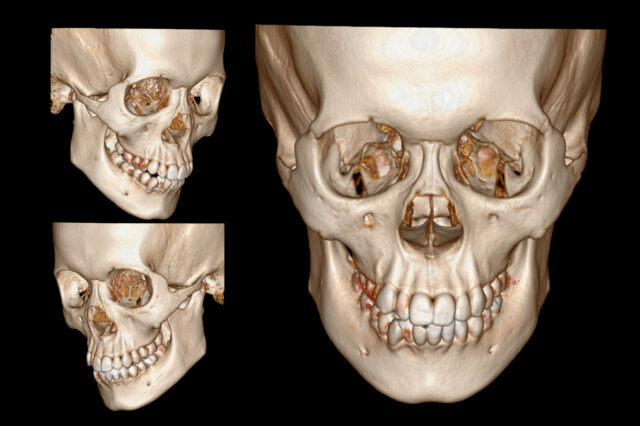University of Florida Health Head and Neck Surgeons Integrate 3D Technologies to Optimize Patient Outcomes

Virtual surgical planning, or VSP, is an invaluable tool for complete head and neck reconstructive surgery that allows the team of surgeons at the University of Florida College of Medicine’s Department of Otolaryngology — part of UF Health, the Southeast’s most comprehensive academic health center — to develop a precise surgical plan on the computer before stepping into the operating room. Only a handful of institutions in the United States use this innovative technology on a regular basis.
With VSP, head and neck surgeons can design and print 3D patient-specific skull models, cutting guides and other instruments for use within the sterile field to facilitate an anatomically-based personalized surgical approach. Common head and neck applications of this technology are tumor excision and facial reconstructive procedures, such as mandibular, maxillary or full jaw reconstruction; craniofacial reconstruction; dental implants with free flap reconstruction; and trauma reduction surgery.
“3D printing technology has changed the way we view oncologic head and neck reconstruction, as it simplifies and shortens a long and complicated procedure,” explains Peter T. Dziegielewski, M.D., FRCS(C), chief of the division of head and neck oncologic surgery at UF. “Virtual surgical planning and 3D modeling reveal complexities of a case before, rather than during a procedure,” he says. Consequently, presurgical planning removes some of the unpredictability associated with reconstructive surgery and enables surgeons to make more accurate incisions. For patients, improved surgical precision can mean less time in the operating room, as well as better cosmesis and functional outcomes.
Since the team integrated this revolutionary technology a few years ago, VSP has become an indispensable tool in oncologic craniomaxillofacial reconstruction, especially with regard to patient education. When patients and their families can view and manipulate an actual replica that duplicates nearly every detail of the original, including the pathology, they are better able to visualize and understand the procedures they will undergo.
The oncologic reconstruction surgical team at UF Health performs technically challenging procedures every day. As leaders in implementing virtual surgical planning into daily practice, the team strives to achieve the best possible outcomes for all patients.